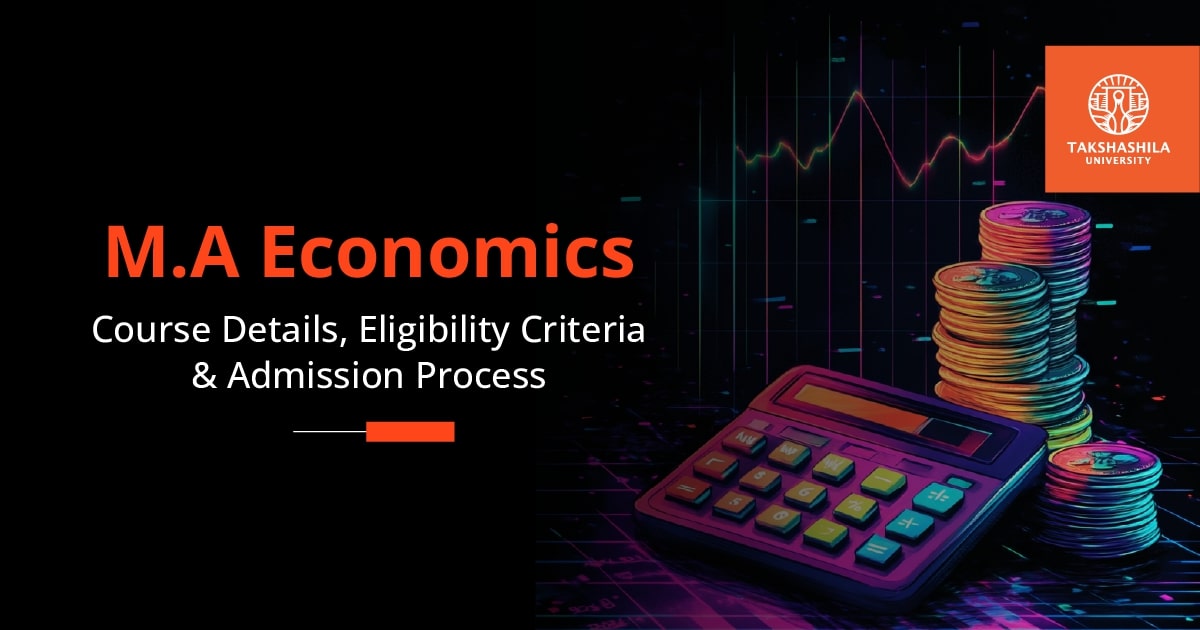Introduction to M A Economics
M A Economics course is a postgraduate program that provides in-depth knowledge of economic theories, analytical tools, and their real-world applications. This course equips students with the skills to analyze complex economic issues and address financial and policy-related challenges effectively. It is ideal for those aiming to build careers in finance, research, government, or academia.
At Takshashila Engineering College, the M.A. Economics program emphasises theoretical rigour and practical application, preparing students for diverse career paths in academia, research, policy-making, and business analytics.
In this article, we examine all the details about M.A. Economics: Course Details, Eligibility Criteria, and Admission Process.

Overview of the M.A Economics Course
The M. A. Economics is designed for two years and extends over four semesters. It includes papers on microeconomics, macroeconomics, econometrics, and other optional electives, including environmental economics, development economics, and financial economics. These allied subjects require research and help students engage with the economics discourse and be active in the world of policy.
Critical Concepts in M.A Economics
The program focuses on the following core and advanced areas:
- Microeconomics, also known as Price Theory, is the study of decision-making at an individual or firm level and the analysis of the allocation, distribution, and usage of resources in a given setting, such as a market.
- Macroeconomics encompasses a country’s economy and its system, including inflation, occupation, and economic growth.
- Econometrics: It’s basically statistical methods applied to economic data to obtain factual evidence for relationships and trends.
- Development economics: This field examines the policies and practices used to advance the economic development of developing countries.
- Public Economics: Delve into the factors that guide and encourage welfare policies and
- International Economics: Explore the mechanics of trade, the process of globalisation, and finance between countries demanding international integration.
Emerging Fields in Economics
The domain of economics has grown to include now includes several of the following new-age domains;
- Behavioral Economics: The merging of psychology with economics to study choices.
- Environmental Economics: Concerns the assessment of the economic effects of environmental policies and development.
- Big data: The avenue of data sciences as applied to predictive targeting of consumers and trends.
- Health economies: Interrogating healthcare systems and their policies and the economic features of these systems.
Career Opportunities in Economics
An M.A in Economics opens up a broad spectrum of career opportunities:
- Economist: Engaged in market studies and advising organisations or governments.
- Data Analyst: decoding trends using econometric language and models.
- Policy Analyst: Responsible for developing, analysing, or appraising any policies aimed at helping solve socio-economic problems.
- Financial Analyst: Management within financial institutions, consultative firms, or investment banks.
- Researcher: Involved in different projects such as academic research, industrial or governmental research
- Teaching: teaching in higher education institutions and can take the role of a lecturer or professor
Eligibility Criteria for M.A Economics
Academic Requirements
- Bachelor’s degree in Economics, Mathematics or a related field with an average mark footprint of not less than 50-60°
- A candidate who has done statistics or commerce. can also be considered for the course, depending on the dictionary meaning of the institution..
Age and Other Considerations
- In most cases, there is no age limit to admission.
Skills Required for M.A Economics Students
- Analytical and problem-solving skills are essential.
- Good working knowledge of mathematics and statistics.
- An awareness of current economic issues at both the global and domestic levels.
Admission Process for M.A Economics
Entrance Exams and Application Process
- Entrance Examinations: A number of institutions have their own entrance tests, such as DUET and JNUEE, along with university-based examinations to evaluate prospective candidates’ knowledge of economics and quantitative techniques.
- Application Process: For example, candidates who have completed and graduated from an accredited university can submit a college application online, including academic records, entrance examination test results, a reference, or sometimes an essay.po
- Personal Interview: The University of Nottingham allows Zoom interviews to be conducted with applicants who have fully submitted their applications to determine their purpose and understanding of economics.
Curriculum and Course Structure
Year-wise Breakdown of Subjects
Year 1:
- Microeconomic Theory
- Macroeconomic Analysis
- Mathematical Methods for Economics
- Statistics and Econometrics
Year 2:
- International Economics
- Development Economics
- Public Finance
- Electives: Environmental Economics, Health Economics, or Behavioral Economics
- Dissertation or Research Project
Top Institutions for M.A Economics
Some of the renowned institutions offering M.A Economics programs include:
- Delhi School of Economics
- Jawaharlal Nehru University
- Takshashila Engineering College
- University of Hyderabad
- Madras School of Economics
Scope and Future for M.A Economics Graduates
Economics is one of those fields that encompasses a large area of study with career opportunities in education, politics, and the private sector. Most graduates become employed by organisations such as the Reserve Bank of India (RBI), NITI Aayog, World Bank or even international companies focusing on global-scale businesses. Other graduates choose to advance their career further in M.Phil. or Ph.D. Economics degree programs are used to get more in-depth and narrow-focused knowledge in the industry.
Laboratory and Practical Training
Though primarily theoretical, the preparation of the M.A in Economics program does provide exposure and practical training on the following:
- Data analysis workshops using software like R, Python, or STATA.
- Research projects involving real-world economic problems.
- Internships with financial institutions, research organisations, or policy think tanks.
Benefits of Studying M.A Economics
- I understand economic and international relations and policies.
- Improving one’s mathematical and analytical skills can have scope in any industry.
- I have multiple rewarding career options.
- Applicant readiness for exams such as UPSC or RBI Grade B.
Challenges Faced by M.A Economics Students
- Application of high-level mathematical and statistical understanding.
- Integration of theory and applied economics.
- I was keeping up pace with changing economies and economic technologies.
Postgraduate and Research Opportunities
Graduates can explore:
- Ph.D. in Economics: Applicants with such degrees might wish to pursue an academic career or a career involving advanced research.
- Specialised Diplomas In Data science, public policies as well as financial analytics
- Certifications: Machine learning, big data, business intelligence, etc., can add to employability.
Comparison with Other Social Science Degrees
Compared to an M.A. in sociology or political science, where great emphasis is placed on a single qualitative element when doing analysis, the M.A. in economics does not only focus on qualitative elements analysis; it integrates quantitative analysis, resulting in greater versatility in terms of the skills acquired. This program is appropriate for students who pursue roles integrated with decision-making processes and policy formulation.
Conclusion
The M.A. Economics Program from Takshashila Engineering College strives to inculcate such competencies in students so they may deal with various intricate economic issues. Graduates are able to actively participate in enhancing economic policies, frameworks, and processes, whether in academia, research, or industry practice.
A combination of theory, statistics, and methods provides for a comprehensive program geared towards a range of careers related to the global economy.
If you want to know more about M A Economics, contact our mentor today at Takshahila Engineering College!
FAQ
Q1: How long would completing an M.A. in Economics in India take?
A1: It takes approximately two years to complete an M.A. in Economics in India, with the coursework broken down into 4 semesters.
Q2: Who can apply for the admission?
A2: One must have completed either a Bachelor’s degree in Economics or a similar discipline with 50-60% aggregate.
Q3: Are international students eligible for enrollment without studying Economics beforehand?
A3: Yes, students with mathematics, statistics, and commerce backgrounds are also eligible.
Q4: What can one expect from the profession after persisting in M.A Economics?
A4: They can apply for jobs as Economists, policy analysts, data analysts, financial analysts, or even academic researchers.
Q5: Is there any opportunity to do further research?
A5: Students can pursue a Ph.D. in Economics, specialized diplomas, or even certification courses in policymaking and data sciences.
Q6: Is there a component for practical training in the program?
A6: Yes, the program has workshops on data analysis, internships, and research projects.






